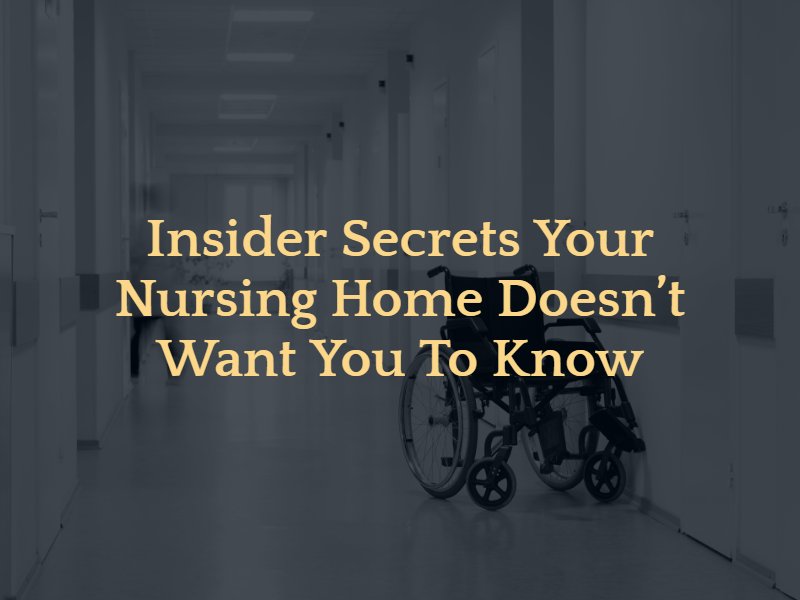
No recovery no fee
There are currently over 1.5 million Americans living in a nursing home, according to the Centers for Disease Control and Prevention. This number is expected to grow exponentially as baby boomers enter into retirement, leaving millions of families across the U.S. wondering how to find a safe nursing home and what they should know before they begin their hunt. Although finding a clean facility that feels right is important, there’s a lot more to be considered. Here are 10 insider secrets that a nursing home doesn’t want you to know:

1.) The most important part of a nursing home is that it feels like home. Moving a loved one into a nursing home should not feel like a jail sentence. That’s why it’s so important that your loved one has the freedom to get up, go to bed or eat whenever he or she wants to. Keep this in mind when touring nursing homes. A big difference between bad nursing homes and good ones is the extent to which residents have preferences accommodated.
2.) Beware of the small print! It’s true in any contract, and nursing homes are no exception. When you review your stack of admissions paperwork, keep an eye out for something called binding arbitration agreements. In short, the home is asking you to sign away your constitutional right to sue if anything happens. If you see this anywhere in the contract, run! Don’t sign it and if you’re really interested in the home, tell them you’ll sign it only after your attorney reviews it. This will keep you and your loved one safe in the long run.
3.) The best time to visit a nursing home you’re considering for your loved one is at 6 p.m. on a Saturday. At this time, dinner has already been served, few managers or marketing people will be in the facility, and you’ll get a more accurate picture of what the home is like. Consider this your time to look around and get a real feel for what it’s like during down time. Most importantly, don’t be afraid to talk with staff and family members of residents. Ask them what they do and don’t like about the facility. Chances are, they’ll be more than happy to share their experience with you and you’ll get an honest answer at that time of night.
4.) Visit the home again! But this time, do it during mealtime. This is usually a very busy time so you’ll get an accurate portrayal of the home at what could be its worst. All too often, residents don’t get enough to eat or drink and it takes weeks for families to find out. By that time, a family has noticed because their loved one is undernourished, has lost weight, and suffered health problems because of it. Come during this time and observe. How are residents being treated? Do they look satisfied? If something seems off, don’t ignore it. Ask questions that address your concerns.
5.) You may be surprised to know that nonprofit nursing homes and government-owned facilities typically have better staffing, pay their staff higher wages, and offer better quality of care than for-profit nursing homes. Keep this in mind when touring different homes so you can compare and contrast.
6.) Federal law requires 75 hours of initial training for a certified nursing assistant, though some states require more. This means that a dog groomer, nail technicians, and hair stylists get more training than those caring for our loved one’s well-being.
7.) Nursing homes are required to create a custom care plan for every resident. Make sure that you’re active in your loved one’s care plan. It’s okay to ask the staff to hold care plan meetings that your participate in. When you do this, you want to make sure that any promises they make are written in the plan. For instance, if your loved one needs their food cut into dime-sized pieces, that should be in there. The more detailed, the better. It’s not enough to simply put your loved one’s food should be cut up. Using words like “dime-sized pieces” will ensure there are no misunderstandings as to what size is appropriate. Don’t forget to include little things like giving your loved one a baked potato once per week. This gives you written evidence of any expectations you had of the nursing home, in case they are not met. Remember: documentation is important.
8.) Has your loved one been seeing the same doctor for years? Unfortunately, they probably won’t be able to see that doctor anymore once in a nursing home. Traditionally, nursing homes have assigned physicians for their facility. On your list of questions, be sure to ask how often the physician sees residents, what the procedure for treatment is, what happens if there is an emergency, and if that physician is easily available. You deserve to know your loved ones healthcare plan.
9.) A nursing home should never tell you that you need to hire a private aide for your loved one. The home is required to provide all necessary care. If your loved one needs extra care, administrators are obligated to provide it.
10.) If your parent goes into a nursing home, the nursing home cannot require you to pay out of your pocket for him or her. Often times, nursing homes will send relatives a bill, insisting that they have to pay. This is simply not true.
Bonus tip: Never believe the first thing you hear. Most nursing homes are in the business of making money. The best thing you can do when searching for a nursing home for your loved one is to do a lot research and ask a lot of questions.
Finding the right place for your loved one to be comfortable can be difficult sometimes. If you or your loved ones face any issues while in the care of a nursing home then Phoenix elder abuse attorneys at Knapp & Roberts. They will ensure that your loved one is being treated the right way and fight for you in cases where they are not.
The personal injury attorneys in Phoenix, Arizona, at Knapp & Roberts have the compassion and trial lawyer skills to tell your story to a jury. We will get to know you and your family so that we can help the jury understand what has happened to you and your family and how it has changed your lives. Obtain the compensation necessary for the injuries and losses you have suffered.